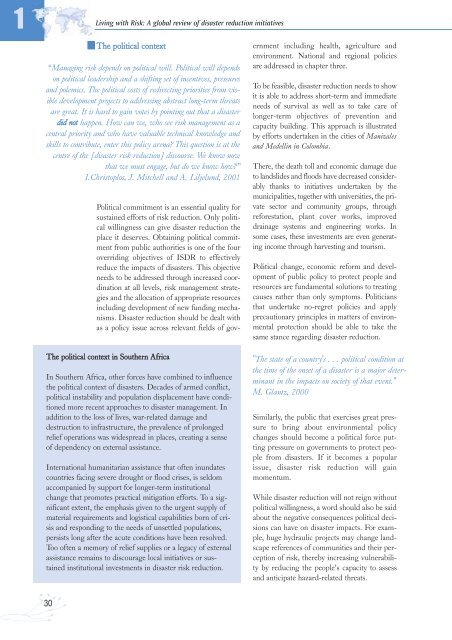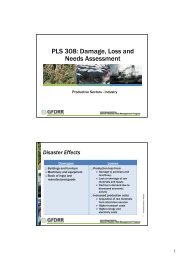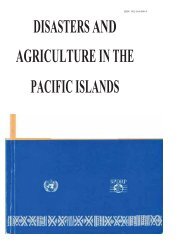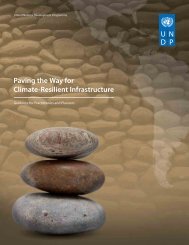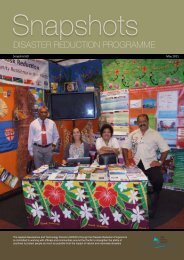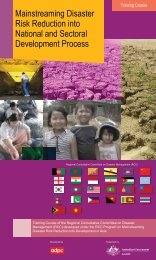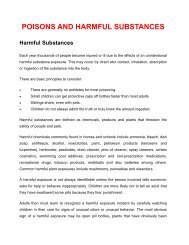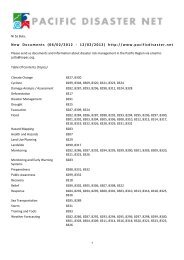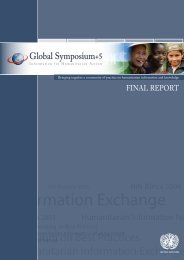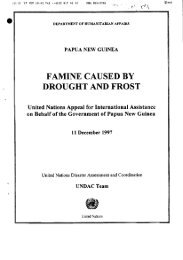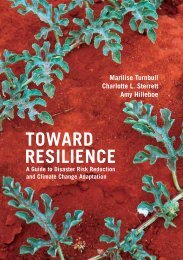A global review of disaster reduction initiatives - Welcome to the ...
A global review of disaster reduction initiatives - Welcome to the ...
A global review of disaster reduction initiatives - Welcome to the ...
Create successful ePaper yourself
Turn your PDF publications into a flip-book with our unique Google optimized e-Paper software.
1Living with Risk: A <strong>global</strong> <strong>review</strong> <strong>of</strong> <strong>disaster</strong> <strong>reduction</strong> <strong>initiatives</strong>The political context“Managing risk depends on political will. Political will dependson political leadership and a shifting set <strong>of</strong> incentives, pressuresand polemics. The political costs <strong>of</strong> redirecting priorities from visibledevelopment projects <strong>to</strong> addressing abstract long-term threatsare great. It is hard <strong>to</strong> gain votes by pointing out that a <strong>disaster</strong>did not happen. How can we, who see risk management as acentral priority and who have valuable technical knowledge andskills <strong>to</strong> contribute, enter this policy arena? This question is at <strong>the</strong>centre <strong>of</strong> <strong>the</strong> [<strong>disaster</strong> risk <strong>reduction</strong>] discourse. We know nowthat we must engage, but do we know how?”I.Chris<strong>to</strong>plos, J. Mitchell and A. Liljelund, 2001Political commitment is an essential quality forsustained efforts <strong>of</strong> risk <strong>reduction</strong>. Only politicalwillingness can give <strong>disaster</strong> <strong>reduction</strong> <strong>the</strong>place it deserves. Obtaining political commitmentfrom public authorities is one <strong>of</strong> <strong>the</strong> fouroverriding objectives <strong>of</strong> ISDR <strong>to</strong> effectivelyreduce <strong>the</strong> impacts <strong>of</strong> <strong>disaster</strong>s. This objectiveneeds <strong>to</strong> be addressed through increased coordinationat all levels, risk management strategiesand <strong>the</strong> allocation <strong>of</strong> appropriate resourcesincluding development <strong>of</strong> new funding mechanisms.Disaster <strong>reduction</strong> should be dealt withas a policy issue across relevant fields <strong>of</strong> gov-The political context in Sou<strong>the</strong>rn AfricaIn Sou<strong>the</strong>rn Africa, o<strong>the</strong>r forces have combined <strong>to</strong> influence<strong>the</strong> political context <strong>of</strong> <strong>disaster</strong>s. Decades <strong>of</strong> armed conflict,political instability and population displacement have conditionedmore recent approaches <strong>to</strong> <strong>disaster</strong> management. Inaddition <strong>to</strong> <strong>the</strong> loss <strong>of</strong> lives, war-related damage anddestruction <strong>to</strong> infrastructure, <strong>the</strong> prevalence <strong>of</strong> prolongedrelief operations was widespread in places, creating a sense<strong>of</strong> dependency on external assistance.International humanitarian assistance that <strong>of</strong>ten inundatescountries facing severe drought or flood crises, is seldomaccompanied by support for longer-term institutionalchange that promotes practical mitigation efforts. To a significantextent, <strong>the</strong> emphasis given <strong>to</strong> <strong>the</strong> urgent supply <strong>of</strong>material requirements and logistical capabilities born <strong>of</strong> crisisand responding <strong>to</strong> <strong>the</strong> needs <strong>of</strong> unsettled populations,persists long after <strong>the</strong> acute conditions have been resolved.Too <strong>of</strong>ten a memory <strong>of</strong> relief supplies or a legacy <strong>of</strong> externalassistance remains <strong>to</strong> discourage local <strong>initiatives</strong> or sustainedinstitutional investments in <strong>disaster</strong> risk <strong>reduction</strong>.ernment including health, agriculture andenvironment. National and regional policiesare addressed in chapter three.To be feasible, <strong>disaster</strong> <strong>reduction</strong> needs <strong>to</strong> showit is able <strong>to</strong> address short-term and immediateneeds <strong>of</strong> survival as well as <strong>to</strong> take care <strong>of</strong>longer-term objectives <strong>of</strong> prevention andcapacity building. This approach is illustratedby efforts undertaken in <strong>the</strong> cities <strong>of</strong> Manizalesand Medellin in Colombia.There, <strong>the</strong> death <strong>to</strong>ll and economic damage due<strong>to</strong> landslides and floods have decreased considerablythanks <strong>to</strong> <strong>initiatives</strong> undertaken by <strong>the</strong>municipalities, <strong>to</strong>ge<strong>the</strong>r with universities, <strong>the</strong> privatesec<strong>to</strong>r and community groups, throughreforestation, plant cover works, improveddrainage systems and engineering works. Insome cases, <strong>the</strong>se investments are even generatingincome through harvesting and <strong>to</strong>urism.Political change, economic reform and development<strong>of</strong> public policy <strong>to</strong> protect people andresources are fundamental solutions <strong>to</strong> treatingcauses ra<strong>the</strong>r than only symp<strong>to</strong>ms. Politiciansthat undertake no-regret policies and applyprecautionary principles in matters <strong>of</strong> environmentalprotection should be able <strong>to</strong> take <strong>the</strong>same stance regarding <strong>disaster</strong> <strong>reduction</strong>."The state <strong>of</strong> a country's . . . political condition at<strong>the</strong> time <strong>of</strong> <strong>the</strong> onset <strong>of</strong> a <strong>disaster</strong> is a major determinantin <strong>the</strong> impacts on society <strong>of</strong> that event."M. Glantz, 2000Similarly, <strong>the</strong> public that exercises great pressure<strong>to</strong> bring about environmental policychanges should become a political force puttingpressure on governments <strong>to</strong> protect peoplefrom <strong>disaster</strong>s. If it becomes a popularissue, <strong>disaster</strong> risk <strong>reduction</strong> will gainmomentum.While <strong>disaster</strong> <strong>reduction</strong> will not reign withoutpolitical willingness, a word should also be saidabout <strong>the</strong> negative consequences political decisionscan have on <strong>disaster</strong> impacts. For example,huge hydraulic projects may change landscapereferences <strong>of</strong> communities and <strong>the</strong>ir perception<strong>of</strong> risk, <strong>the</strong>reby increasing vulnerabilityby reducing <strong>the</strong> people’s capacity <strong>to</strong> assessand anticipate hazard-related threats.30


